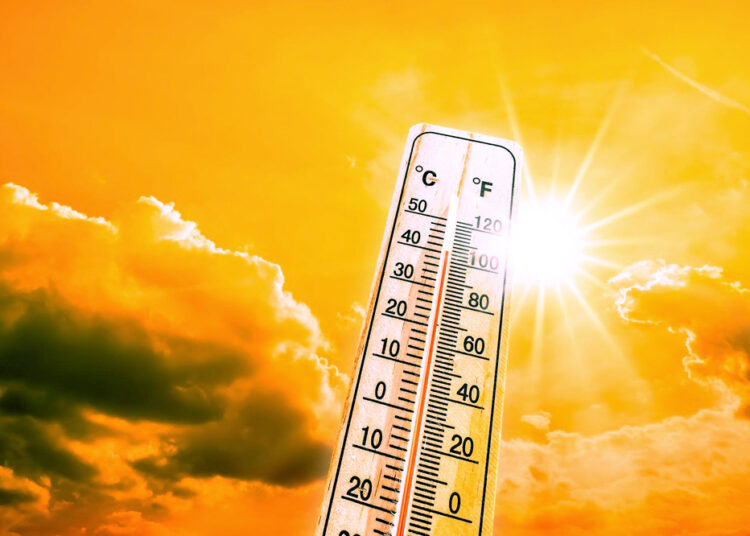Recently, the Nigerian Meteorological Agency (NIMET) raised the alarm over weather conditions across the country that are generating immense heat wave, a prolonged period of excessively hot weather, typically accompanied by high humidity and minimal precipitation. The agency pointed out that air temperatures have hit 41°c over the North and 39°C over the South with model projections indicating temperatures to remain high in the coming days.
This weather condition is already playing out as the rains are unusually delayed, a situation made worse by the crisis in the energy sector and the attendant epileptic power supply as well as high price of fossil fuel that is making it near impossible to power generating sets for those who have them.
NIMET, in the opinion of this newspaper, is proactive enough to have drawn the attention of Nigerians to this matter just as it urged Nigerians to watch out for possible dehydration and the likely accompanying consequences. According to it, and as a result of the high temperature, people will experience dehydration which could cause fainting, Chickenpox, Measles and heat rash. Similarly, it said that people could experience weakness of the body, slight fever, dry lips; heat-related illnesses, respiratory issues and increased vulnerability to chronic conditions.
Already, Nigerians are grappling with intense the heatwave. Experts warn that the implication of this weather condition for the people is far-reaching and demand urgent attention. For weeks now, the weather all over the country has been relatively hot with many complaining of not sleeping at night and irritability. The current heatwave is characterized by soaring temperatures, unabating discomfort which pose risks to human health and well-being.
This weather condition is attributable to the negative effects of global warming caused, essentially, by human activities that are affecting the environment, causing the ozone layer to deplete fast thereby exposing the earth to direct rays of the sun.
The primary causes of the heatwave in Nigeria, according to climate experts, are multifaceted with both natural and anthropogenic factors at play. As a result, earlier this year, we recall that the Nigeria Centre for Disease Control (NCDC) issued an advisory on Cerebro- Spinal Meningitis (CSM), an epidemic – prone disease with infections reported all year round.
The highest burden of CSM in Nigeria occurs in the ‘Meningitis Belt’ which includes all 19 states in the northern region, the Federal Capital Territory (FCT) and some southern states such as Bayelsa, Cross River, Delta, Ekiti, Ogun, Ondo and Osun.
The NCDC explained that CSM is caused by acute inflammation of the coverings of the brain and spinal cord and that weather conditions like the dry season with dust, winds and cold nights aided by overcrowding, poor ventilation and frequent upper respiratory tract infections increase the risk of contracting the disease.
Nigeria recorded in 2,765 suspected and 303 confirmed cases in 2022/2023 with 190 deaths across 140 council areas in 30 states, including the FCT.
But in the view of this newspaper, despite significant progress in surveillance, diagnostic capacity and vaccination over the last few years, CSM remains a priority disease and ever-present public health threat in Nigeria, with yearly outbreaks in high-burden states that present a challenge for people, health systems, economies and communities.
Although, with regards to scientific proofs that the epidemiology of meningitis is not fully understood, but it is more commonly seen during the dry season, from December to June, in the African meningitis belt. It is a fact that harsh weather conditions like the one the nation is experiencing now, can favour prevalence of meningitis. Yet, the lapse in coordinated response to reducing casualties has not been bridged.
Last week, Yobe state quarantined 206 persons after recording 20 deaths from meningitis, while Gombe reported six deaths. Data obtained from the NCDC noted that as of March 3, 2024, 82 local government areas in 22 states have reported 1,402 22 suspected cases, 101 confirmed cases, and 123 deaths with a case fatality rate of 9.4 per cent since October 2023. The data showed that the age group mostly affected are from five to 14, followed by age 15 -29 years.
In our considered opinion, this is a wakeup call to health authorities to apply precautionary measures and timely response instead of the fire brigade approach to ways of doing things. In the meantime, we welcome the arrival of the MenFive meningitis vaccine from the Vaccine Alliance-funded global stockpile, into the country, amid the outbreak of meningitis in a number of states, including Yobe and Gombe.
We are aware that with this development, the country becomes the first to receive the new MenFive meningitis vaccine shipment delivered by the United Nations Children’s Fund (UNICEF). In a statement it said that the ICG approved the deployment of 1,043,377 doses of MenFive in response to Nigeria’s request.
With the availability of this drug, we are persuaded to remind the ministries of health of the urgency of deploying same to the epidemic- prone states in order to curtail this disease and save lives. It is imperative that this is done expeditiously so as to forestall the effects of the weather on Nigerians.





